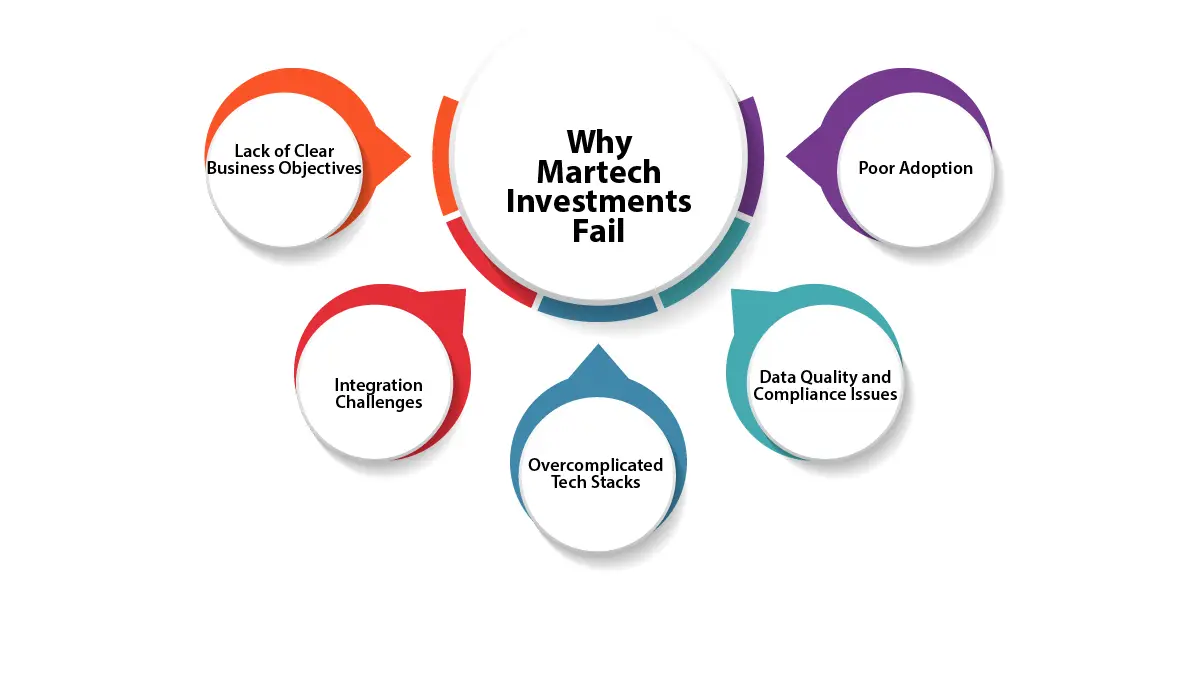Martech has changed the way businesses connect with customers. It helps automate tasks and improve campaigns. Martech budgets now make up almost a quarter of all marketing spending. So, companies are putting a lot of money into digital transformation. Research shows that up to 60% of Martech initiatives fail. This happens even with investments made. They often do not deliver the expected return on investment. Moreover, Gartner’s 2023 Marketing Technology Survey revealed that martech utilization has plummeted to 33%, creating risk and making CMOs rethink.
The issue is rarely the technology itself. Instead, failures often stem from strategic misalignment, poor integration, and low adoption rates. Without a clear vision, organizations end up overwhelmed by tools that don’t meet their needs. This article will look at why Martech fails. We’ll share real examples and give strategies. These tips will help businesses make the most of their Martech investments.
The Cost of Failed Martech Investments
Failed Martech investments go beyond financial losses. They waste valuable time, frustrate employees, and erode trust in digital transformation efforts. Many companies buy Martech solutions with high hopes. But often, they don’t use them well. This can happen because of poor onboarding, lack of training, or the tools just not being the right fit.
Many organizations watch trends but often miss how tools help their customer engagement. Others accumulate a disjointed collection of tools, creating inefficiencies instead of streamlining processes. The result? Missed opportunities, wasted resources, and a lack of measurable impact.
Why Martech Investments Fail
Lack of Clear Business Objectives
One of the most common reasons for Martech failure is the absence of well-defined goals. Many companies invest in new technologies. They often don’t clearly understand how these solutions address specific challenges. A global retail brand spent millions on a personalization engine. However, it didn’t set KPIs or a clear roadmap for using it. As a result, the tool went largely unused, delivering no measurable value.
Poor Adoption
Even the right tools can fail if employees don’t embrace them. Resistance to change, lack of training, and cumbersome systems often hinder adoption. A SaaS company launched a marketing automation platform. However, it had low usage because onboarding was not effective. Without proper adoption, the tool’s potential remained untapped, leading to disappointing ROI.
Integration Challenges
Disconnected systems are a major barrier to Martech success. Many companies struggle with tools that don’t communicate effectively with existing platforms. A financial services firm, for instance, invested in a marketing automation platform. But it didn’t work with their old CRM. This left important data isolated. As a result, personalization efforts were weak, leading to inconsistent customer experiences.
Overcomplicated Tech Stacks
Businesses often accumulate multiple tools with overlapping functionalities, leading to confusion and inefficiency. A B2B tech company used five email marketing tools across various departments. Inconsistent messaging and reporting challenges arose from the lack of standardization. This ultimately harmed the customer experience.
Data Quality and Compliance Issues
Martech tools need data to work well. However, bad data can hurt their performance. An e-commerce company set up a customer data platform. But, they faced issues with old and duplicate records. This made it hard to target customers effectively and led to wasted spending. Not following data privacy rules like GDPR and CCPA can lead to legal risks for businesses. This can put their investments at risk.
Also Read: Top 5 Reputation Management Platforms to Safeguard Your Brand in the Digital Age
How to Ensure Martech Success
Align Technology with Business Goals
Every Martech investment should support the company’s broader objectives. Set clear goals instead of following trends. Focus on improving customer retention, increasing engagement, or streamlining operations. Then, pick tools that meet these needs. Establish measurable KPIs upfront to track progress and make data-driven adjustments.
Foster Cross-Department Collaboration
Martech success requires collaboration across marketing, IT, sales, and customer service. Siloed decision-making creates disconnected experiences. Involve all relevant teams early in the process. IT helps avoid integration issues, and sales make sure tools boost revenue.
Prioritize User Adoption
Adoption is critical to realizing Martech’s potential. Invest in structured training. Appoint internal Martech champions. Also, provide ongoing support to boost usage. Foster a culture of ongoing learning. This helps teams use their tools effectively.
Focus on Integration
A seamless tech stack is essential for success. Pick tools that work well together and have open APIs. This helps with easy data flow and better analytics. Don’t gather random tools. Build a smooth system that offers a connected customer experience.
Conduct Regular Audits and Optimizations
Regularly review your Martech stack. This helps you find overlaps, cut waste, and align it with your changing business needs. Regular performance reviews and data-driven changes will increase your investment value over time.
The Role of AI in Martech Success
AI is fundamentally reshaping Martech by enabling smarter decision-making, automation, and enhanced personalization. Its real value is in how it complements human expertise, not in replacing it. Businesses that use AI in their Martech strategies can boost efficiency. They can also improve marketing campaigns and enhance customer experiences.
Successful organizations don’t let AI make all their decisions. Instead, they use it as a tool for insights, trend analysis, and support in execution. AI can help evaluate marketing content, refine targeting strategies, and streamline operations. AI helps companies boost human creativity and decision-making. This leads to better efficiency and results.
In our podcast with Marc Sirkin, CEO of Third Door Media, we talked about how AI is changing the Martech world. Businesses can harness AI to streamline processes, enhance personalization, and drive superior results. Success comes from using AI as a strategic partner. It should enhance human creativity and decision-making, not replace them.
Marc said that AI tools like Searchbot and Martechbot are changing how marketers work. His team uses AI to improve content strategies. It boosts productivity and aids leadership decisions. He uses AI to assess copywriting frameworks. It helps improve promotional emails and boost audience engagement.
The Importance of Brand in Martech
In an increasingly commoditized Martech landscape, brand differentiation is more critical than ever. Companies that focus on building their brand connect better with their audience. This leads to stronger loyalty and trust over time.
Businesses need to look beyond just campaigns. They should think about brand positioning as a whole. It’s important to keep things consistent at every customer touchpoint. A strong brand goes beyond visuals. It creates a meaningful experience that connects with customers over time.
Marc Sirkin emphasized that branding has made a strong comeback in Martech strategies. He said, “Brand is back with a vengeance.” He pointed out that branding is harder to measure than lead generation. But, it’s crucial for long-term success. Companies that tell stories, show authenticity, and connect with customers will stand out in the market.
Conclusion
Martech investments can change marketing operations. But to succeed, you need more than just the latest tools. Organizations should match technology with their business goals. They need to focus on adoption and training. Also, they must ensure smooth integration throughout their ecosystems. A smart, all-around approach helps companies dodge common Martech failures. This way, they can tap into the full potential of their investments.
Marc Sirkin said it well: “Martech success is not just about technology. It’s about people, processes, and strategy working together for real results.” When used correctly, Martech boosts business growth rather than becoming a costly error.


Comments are closed.